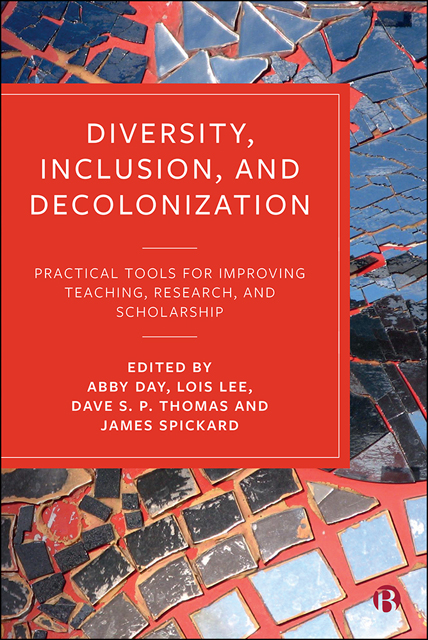 Diversity, Inclusion, and Decolonization
Diversity, Inclusion, and Decolonization Book contents
- Frontmatter
- Contents
- List of Figures and Tables
- Notes on Contributors
- Acknowledgements
- Typographical Note
- Introduction: Why Diversity, Inclusion, and Decolonization Matter
- Part I Changing Universities
- Part II Diversifying Curricula
- Part III Diversifying Research and Scholarship
- Part IV Overcoming Intellectual Colonialism
- Epilogue: What We Have Learned
- Index
3 - Doing Diversity Inclusively: ‘East Asians’ in Western Universities
Published online by Cambridge University Press: 13 October 2022
- Frontmatter
- Contents
- List of Figures and Tables
- Notes on Contributors
- Acknowledgements
- Typographical Note
- Introduction: Why Diversity, Inclusion, and Decolonization Matter
- Part I Changing Universities
- Part II Diversifying Curricula
- Part III Diversifying Research and Scholarship
- Part IV Overcoming Intellectual Colonialism
- Epilogue: What We Have Learned
- Index
Summary
Introduction
This chapter responds to a growing demand for recognition of plural forms of knowledge production in higher education. It focuses on Chinese and other students from so-called ‘East Asia’, a racialized term. An oftenforgotten group, they remain peripheral, despite the joint contribution of anti-imperialist, postcolonial, multiculturalist, feminist, indigenous, and diversity scholars. This marginalization calls for reflection. For example, in current inclusion approaches, progressive gender quotas in referencing may apply only to gendered, western names, and decolonial initiatives appeal only to those invested in understanding colonialism. While other examples abound, this chapter discusses how ‘East Asians’ are racialized and subject to western racism and coloniality. Ignorance and misrecognition of this group prohibit diversity agendas from including them on equal, participatory terms. To illustrate this, I contrast two inclusion approaches. In British universities, ethnic Chinese international students are included by enrolment; however, as non-white, non-western foreigners, they struggle with knowledge production that alienates theirs and with campus structures insufficiently supporting them. Meanwhile, universalist Christians may recognize these students’ global orientations but include them by misinterpreting their ‘religious’ inclinations for potential evangelical conversion. Significantly, these two approaches co-produce and reproduce the Eurocentric secularversus-religious divide by ethnically sorting students into differentiated channels of integration.
As Nye (2019, p 3) argues, campus diversity that ‘keeps intact the shell’ of knowledge structures reduces itself to an institutional showcase. To facilitate participation of long-standing others requires diversity work that decolonizes a knowledge system that excludes, misrecognizes, and mispresents marginal perspectives. This chapter starts by locating ‘East Asian’ international students in Britain. Identifying their marginality, I acknowledge Christian attempts for universalist inclusion. Through a United Kingdom (UK)-based study, I illuminate how academic categories impact upon student experience on campus.
Racialized ‘East Asian’ students in postcolonial Britain
Historians trace the arrival of foreign students in Britain back to its colonial era. Handpicked sons of noble families in African colonies became culturalsavvy facilitators for colonial trade expansions (Perraton, 2014; Walker, 2014; Pietsch, 2015). In 1875, the Indian colonial government recruited British professors to produce loyal ‘Anglicised Indian elites’ (Walker, 2014, p 329).
- Type
- Chapter
- Information
- Diversity, Inclusion, and DecolonizationPractical Tools for Improving Teaching, Research, and Scholarship, pp. 48 - 63Publisher: Bristol University PressPrint publication year: 2022


